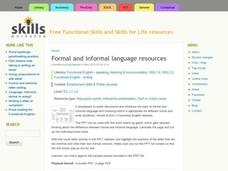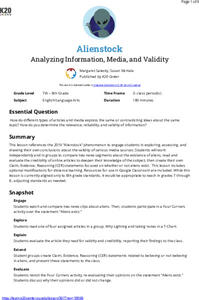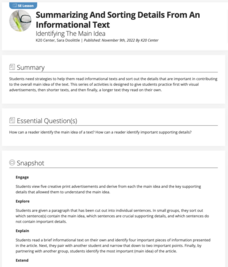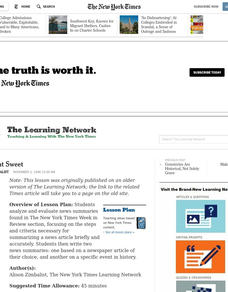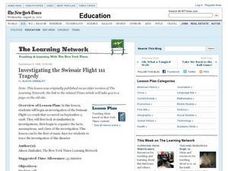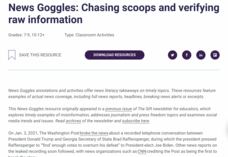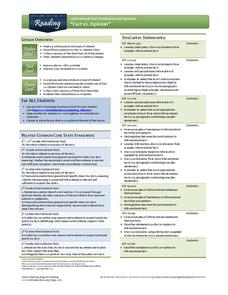Mark Twain Media
Understanding Informational Text Features
Everything you need to know about informational text features can be found in this resource. Recognizing these types of text features and how they are used in text allows readers to better understand information. Teachers can use this as...
Polk Bros Foundation
I Can Locate and Classify Information About a Topic
After reading a text, ask your pupils to recall and organize what they've just learned into a blank three-column chart. Class members write the topic and fill in the columns with information. The sheet also prompts students to write a...
Curated OER
Formal and Informal Language Resources
Yo! Check it out. Here's a lesson on formal and informal language. And the packet includes a game. What fun!
Ontario
Reading Informational Text
Learning to recognize the importance of the features of information text (i.e., titles, subtitles, endnotes, sidebars, etc.) is the focus of a reading activity designed for middle schoolers. Learners examine how these text features help...
K20 LEARN
Alienstock: Analyzing Information, Media, And Validity
One only has to watch MSMBC and FOX News to realize that media can present the same story in very different ways. Middle schoolers have an opportunity to test their ability to determine the validity and trustworthiness of information by...
K20 LEARN
Summarizing and Sorting Details from an Informational Text: Identifying the Main Idea
Scholars participate in two activities that teach them to identify the main idea and key supporting details in informational text. Partners create a visual that reflects the main idea and key supporting details in an informational text...
Curated OER
Press Review
How can word choice affect a political speech? Middle and high schoolers examine the text of the 1999 State of the Union Address, and then determine how newspaper articles and television reports describe and analyze the event. Use this...
Curated OER
Short But Sweet
After analyzing and evaluating news summaries found in the New York Times "Week in Review" section, middle schoolers study the steps for summarizing a news article briefly and accurately. They write two news summaries: one on a newspaper...
Curated OER
Is That a Fact?
Investigate popular scientific claims and gather evidence to defend or argue against an author's stance. Writers synthesize information and compose their own "Really?" columns modeled after those found in the weekly "Science Times"...
Channel Islands Film
Santa Cruz Island - Writing for Information
After re-viewing a documentary segment on the restoration of Santa Cruz Island,, individuals craft an essay in which they compare the views of the various stake holders featured in the video and identify the point of view they find the...
Fluence Learning
Writing About Informational Text: Beyond the Beyond—Galaxies
Everyone has a different point of view, even when it comes to the enormity of the universe. Two separate text passages explain the scope of a galaxy, prompting young readers to write an essay about each author's argument and how the...
Curated OER
Investigating the Swissair Flight 111 Tragedy
Middle schoolers read two articles about the same event: "Plane from J.F.K Crashes off Canada" from the New York Times and "No Survivors from Crash of Swissair Jetliner Off Nova Scotia" from the Associated Press. They then compare the...
One Stop English
A Lesson on Register
The classroom might not be the best place for informal language, but it's a great place to teach middle and high schoolers how to identify the correct language register for their audience. A short lesson on formal and informal language...
Curated OER
Taboo Table Talk
Create memories for your family that are enjoyable, as well as helping to enhance their ability to read and understand information.
News Literacy Project
News Goggles: Chasing Scoops and Verifying Raw Information
A 23-slide presentation teaches young media analysts how to identify a scoop or exclusive first report of a breaking story, how these reports become verified, and how subsequent reports in other news sources add information or refocus...
Nancy N. Boyles
Summary Frame for Story Text and Informational Text
Provide these templates as aids for pupils as they work to compose summaries of both stories and informational texts. The first two frames provide sentence starters to help learners structure their summaries and include all the necessary...
Media Smarts
The Newspaper Front Page
Hot off the presses! A perfect instructional activity idea for a journalism class or even a language arts class looking to incorporate some informational texts. Young writers analyze the front pages of various newspapers to determine the...
Curated OER
Youth Emergency Preparedness
What is an emergency, why is preparing for one important, and how can your pupils help others prepare for an emergency? Answer these questions and more with a short unit. Learners will participate in a variety of collaborative,...
For the Teachers
Fact vs. Opinion
Many informational texts are written as factual, but can your learners determine when an opinion is presented as fact? Have your kids read several articles on the same topic and record the statements that contain either facts or...
For the Teachers
Sequence Plot Chart
Your kids can identify the plot sequence of a short story, but what about an informational article? Have them examine the chronological order of events in informational texts with a lesson on the sequence of events.
Polk Bros Foundation
How to Summarize a Non-Fiction Passage
After reading a text, one way to find out how much your class comprehended is to ask your pupils to summarize. This worksheet helps class members prepare for writing a summary of a nonfiction text. They note down the topic, up to eight...
ReadWriteThink
"Three Stones Back": Using Informational Text to Enhance Understanding of Ball Don't Lie
"Three Stones Back," a passage from Matt de la Pena's best-seller, Ball Don't Lie, allows readers to practice their close reading skills as they compare the passage to an information text about wealth inequality.
Curated OER
The Internet of Things: IoT
How has the Internet of Things affected our lives? Scholars examine the massive influence of mobile devices in this analysis instructional activity, which begins with a seven-minute documentary clip. They also read a New York Times...
Civil War Trust
Contrasting the North and South before the War
Learners create a standing cube with four panels that display information on the North and South's economy, geography and climate, society, and means of transportation before the Civil War. Through discussion and reading informational...
Other popular searches
- Informational Text
- Geographic Information Systems
- Student Information Systems
- Informational Text Features
- Information Media & Technology
- Informational Text Passages
- Locating Information
- +Student Information Systems
- Information Technology
- Information Literacy
- Research Information Literacy
- Gis




